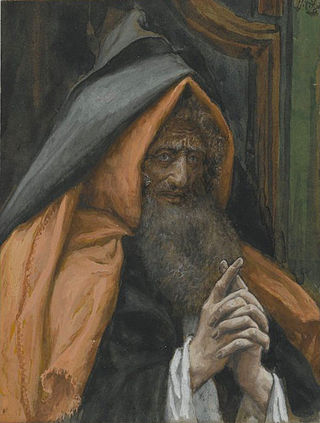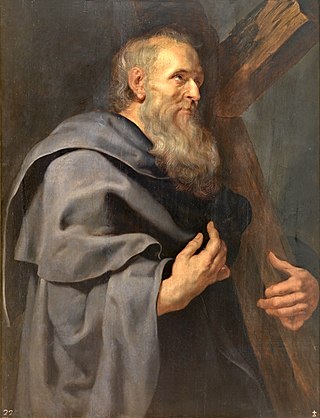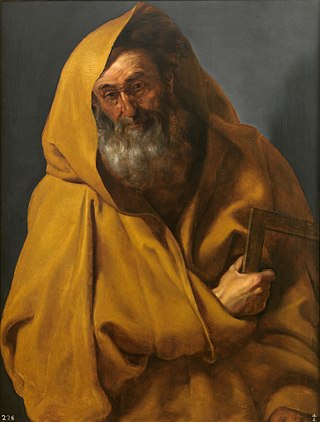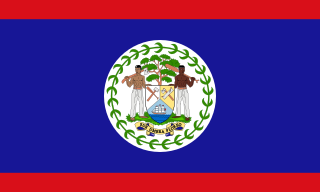
Barnabas, born Joseph (Ἰωσήφ) or Joses (Ἰωσής), was according to tradition an early Christian, one of the prominent Christian disciples in Jerusalem. According to Acts 4:36, Barnabas was a Cypriot Levite. Identified as an apostle in Acts 14:14, he and Paul the Apostle undertook missionary journeys together and defended Gentile converts against the Judaizers. They traveled together making more converts, and participated in the Council of Jerusalem. Barnabas and Paul successfully evangelized among the "God-fearing" Gentiles who attended synagogues in various Hellenized cities of Anatolia.

John the Apostle, also known as Saint John the Beloved and, in Eastern Orthodox Christianity, Saint John the Theologian, was one of the Twelve Apostles of Jesus according to the New Testament. Generally listed as the youngest apostle, he was the son of Zebedee and Salome. His brother James was another of the Twelve Apostles. The Church Fathers identify him as John the Evangelist, John of Patmos, John the Elder, and the Beloved Disciple, and testify that he outlived the remaining apostles and was the only one to die of natural causes, although modern scholars are divided on the veracity of these claims.

Joseph of Arimathea is a Biblical figure who assumed responsibility for the burial of Jesus after his crucifixion. Three of the four canonical Gospels identify him as a member of the Sanhedrin, while the Gospel of Matthew identifies him as a rich disciple of Jesus. The historical location of Arimathea is uncertain, although it has been identified with several towns. A number of stories about him developed during the Middle Ages.

Philip the Apostle was one of the Twelve Apostles of Jesus according to the New Testament. Later Christian traditions describe Philip as the apostle who preached in Greece, Syria, and Asia-Minor.

The Church of Scotland is a Presbyterian denomination of Christianity that holds the status of the national church in Scotland. It is one of the country's largest, having 259,200 members in 2023. While membership in the church has declined significantly in recent decades, the government Scottish Household Survey found that 20% of the Scottish population, or over one million people, identified the Church of Scotland as their religious identity in 2019.

Simon the Zealot, also the Canaanite or the Canaanean, was one of the apostles of Jesus. A few pseudepigraphical writings were connected to him, but Jerome does not include him in De viris illustribus written between 392 and 393 AD.

Uriel, Auriel or Oriel is the name of one of the archangels who is mentioned in the post-exilic rabbinic tradition and in certain Christian traditions. He is well known in the Russian Orthodox tradition and in folk Catholicism and recognised in the Anglican Church as the fourth archangel. He is also well known in European esoteric medieval literature. Uriel is also known as a master of knowledge and archangel of wisdom.

Jude was one of the Twelve Apostles of Jesus according to the New Testament. He is generally identified as Thaddeus and is also variously called Judas Thaddaeus, Jude Thaddaeus, Jude of James, or Lebbaeus. He is sometimes identified with Jude, the brother of Jesus, but is clearly distinguished from Judas Iscariot, the disciple who betrayed Jesus prior to his crucifixion. Catholic writer Michal Hunt suggests that Judas Thaddaeus became known as Jude after early translators of the New Testament from Greek into English sought to distinguish him from Judas Iscariot and subsequently abbreviated his forename. Most versions of the New Testament in languages other than English and French refer to Judas and Jude by the same name.
Christianity is the dominant religion in the United Kingdom. Results of the 2021 Census for England and Wales showed that Christianity is the largest religion, followed by the non-religious, Islam, Hinduism, Sikhism, Judaism, Buddhism, and Taoism. Among Christians, Anglicanism is the most common denomination, followed by Catholicism, Presbyterianism, Methodism, Unitarianism, and Baptism. Results for the 2022 census in Scotland showed that 38.8% of the Scottish population identified as Christian, with 20.4% stating that the Church of Scotland is their main religion, whilst 13.3% stated their main religion was the Catholic church in Scotland.
In Christian history, the seven heavenly virtues combine the four cardinal virtues of prudence, justice, temperance, and fortitude with the three theological virtues of faith, hope, and charity.

Johnston is a village, parish and community in the former hundred of Roose, Pembrokeshire, Wales, and a parish in the diocese of Diocese of St David's.

James, son of Alphaeus was one of the Twelve Apostles of Jesus, appearing under this name in all three of the Synoptic Gospels' lists of the apostles. He is generally identified with James the Less and commonly known by that name in church tradition. He is also labelled "the Minor", "the Little", "the Lesser", or "the Younger", according to translation. He is distinct from James, son of Zebedee and in some interpretations also from James, brother of Jesus. He appears only four times in the New Testament, each time in a list of the twelve apostles.

Christianity is the dominant religion in Belize. The single largest denomination is the Catholic Church with about 40.1% of the population, a reduction from 49.6% of the population in 2000, 57.7% in 1991 and 61.9% in 1980, although absolute numbers have still risen. Other major groups include Pentecostal with 8.4% of the population up from 7.4% in 2000 and 6.3% in 1991, Seventh-day Adventists with 5.4% of the population up from 5.2% in 2000 and 4.1% in 1991. The following of the Anglican Church has been steadily declining, with only 4.7% of the population in 2010 compared to 6.95% in 1991. About 12,000 Mennonites live mostly in the rural districts of Cayo and Orange Walk. People who declared they belong to no religion make up 15.5% of the population in 2010, more than double their 2000 census numbers. 11.2% adhere to other religions which include the Maya religion, Afro-Caribbean religions, Mormons, Hindus, Buddhists, Muslims, Baháʼís, Rastafarians and others.
The application of the labels "cults" or "sects" to religious movements in government documents usually signifies the popular and negative use of the term "cult" in English and a functionally similar use of words translated as "sect" in several European languages. Government reports which have used these words include ones from Austria, Belgium, Canada, China, France, Germany, and Russia. While these documents utilize similar terminology they do not necessarily include the same groups nor is their assessment of these groups based on agreed criteria. Other governments and world bodies also report on new religious movements but do not use these terms to describe them.

A Christian is a person who follows or adheres to Christianity, a monotheistic Abrahamic religion based on the life and teachings of Jesus Christ. Christians form the largest religious community in the world. The words Christ and Christian derive from the Koine Greek title Christós, a translation of the Biblical Hebrew term mashiach (מָשִׁיחַ). While there are diverse interpretations of Christianity which sometimes conflict, they are united in believing that Jesus has a unique significance. The term Christian used as an adjective is descriptive of anything associated with Christianity or Christian churches, or in a proverbial sense "all that is noble, and good, and Christ-like."

Idebessos or Idebessus, also known as Edebessus or Edebessos or, was an ancient city in Lycia. It was located at the foot of the Bey Mountains to the west of the Alakır river valley. Today its ruins are found a short distance to the west of the small village of Kozağacı in the Kumluca district of Antalya Province, Turkey. The site, 21 kilometres north-northwest of Kumluca, is overgrown with forest and hard to reach.

On 26 July 2016, two Islamist terrorists attacked participants in a Mass at a Catholic church in Saint-Étienne-du-Rouvray, Normandy, northern France. Wielding knives and wearing fake explosive belts, the men took six people captive and later killed one of them, 85-year-old priest Jacques Hamel, by slitting his throat, and also critically wounded an 86-year-old man. The terrorists were shot dead by BRI police as they tried to leave the church.
Heterodox teaching is a concept in the law of the People's Republic of China (PRC) and its administration regarding new religious movements and their suppression. Also translated as 'cults' or 'evil religions', "heterodox teachings" are defined in Chinese law as organizations and religious movements that either fraudulently use religion to carry out other illegal activities, deify their leaders, spread "superstition" to confuse or deceive the public, or "disturb the social order" by harming people's lives or property.














